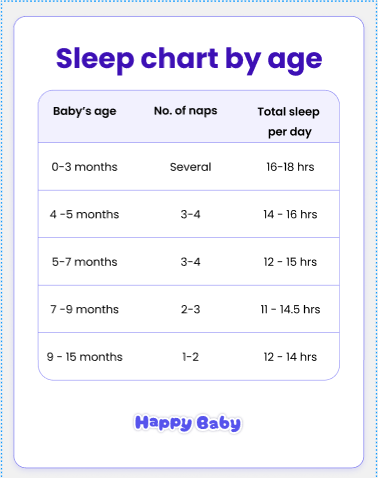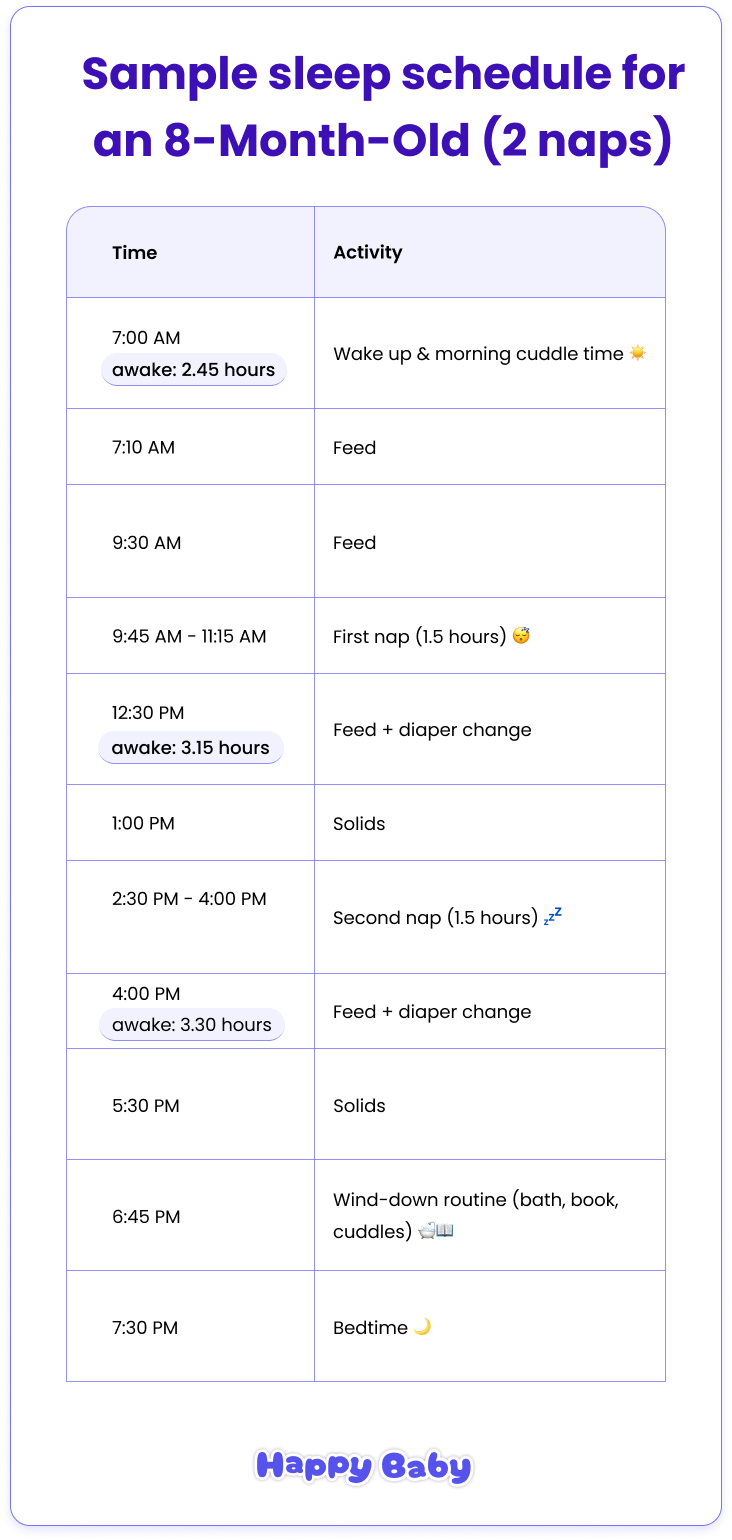
Updated on
11.4.25
A new day begins, and there you are—running on caffeine and the sheer determination of a sleep-deprived parent. Your once well-rested baby is suddenly fighting naps, waking up at odd hours, and turning bedtime into a full-blown protest. You check the clock—3 AM. Why is this happening? What changed? And will I ever sleep again?
Spoiler: It’s not you. It’s your baby. At 8 months old, they’re going through a whirlwind of development that can shake up their sleep. Nap transitions, teething, separation anxiety—it’s a lot. But don’t worry, you’re not alone, and this phase won’t last forever. With the right guidance, tools, and support, you can leave stress behind and enjoy those precious moments with your little one.
By 8 months, your baby is more active, curious, and eager to explore the world—great for development, not so great for sleep. Longer wake windows, nap transitions, and new skills (like crawling!) can shake up their routine. But don’t worry; we’ll help you navigate these changes and get your sleep back on track.
You finally get your baby down for a nap, tiptoe out of the room, and—bam! They’re awake 30 minutes later, ready to party. Or maybe bedtime feels like a never-ending game of “Just One More Cuddle.” Sound familiar? At 8 months, sleep needs are shifting, wake windows are stretching, and figuring out the perfect balance can feel like a puzzle. But don’t worry, we’ve got the missing pieces.
At this age, babies need about 12-16 hours of total sleep in a 24-hour period, according to the American Academy of Sleep Medicine [1]. Most 8-month-olds thrive on around 14 hours of sleep daily, but some may need more or less. Here’s how that typically breaks down:

Sleep isn’t just about avoiding overtiredness and mini-meltdowns—it’s a critical part of brain and body development [2]. During sleep, your baby’s brain is hard at work, forming neural connections that support learning, memory, and emotional regulation. Research shows that high-quality sleep is linked to better cognitive growth, problem-solving skills, and even language development in infancy.
Beyond brainpower, sleep is essential for physical growth and motor skills [3]. During deep sleep, the body releases growth hormones, strengthens the immune system, and restores energy levels. That’s why a well-rested baby is often a happier, more engaged baby.
While these sleep recommendations provide a general guideline, every baby is different. Some may naturally sleep at the lower end of the range, while others need the full 16 hours. Mostly, babies' sleep habits depend on how often they need to eat [4].

Instead of stressing over the exact number of sleep hours, focus on your baby’s mood and energy levels. If they’re overtired and quickly irritated, they may need more sleep. If they’re resisting naps or waking frequently at night, a small tweak in their schedule could help.
The goal isn’t to follow a perfect schedule—it’s to create a rhythm that works for your baby so that your baby gets the rest it needs to grow, explore, and thrive.
By 8 months, your baby is settling into a more predictable sleep routine—well, most of the time. If you’ve been wondering how to balance naps, wake windows, and bedtime, you’re not alone! Most babies at this age thrive on two solid naps per day and 10-12 hours of sleep at night. But here’s the thing—flexibility is key because no two babies follow the exact same schedule.
Whether your little one is an early riser or prefers a later start, understanding their natural sleep cues and wake windows will help you craft a schedule that works for both of you. Here’s an example of what an 8-month-old’s day might look like:

While this schedule offers a solid framework, your baby’s individual needs and temperament will influence their actual sleep patterns. Some things to keep in mind:
Still wondering how to tailor a schedule specific to your baby’s needs? With Happy Baby’s personalized schedule creator, you can track wake windows, adjust nap times, and build a custom sleep plan that actually works.
At 8 months, your baby’s sleep needs are shifting—again. Just when you think you’ve got nap times figured out, they start fighting sleep, waking up too soon, or refusing naps altogether. If this sounds familiar, you’re likely in the middle of a wake window adjustment or a nap transition.
Most 8-month-olds are moving from three naps to two, stretching their wake windows, and learning to stay awake a little longer before sleeping. But making that transition smooth? That’s the real challenge. So, how do you time naps just right and prevent bedtime meltdowns? Let’s break it down.
Wake windows—the time your baby stays awake between naps—are key to better sleep. At 8 months, wake windows gradually increase throughout the day to prevent overtiredness and ensure your baby is sleepy enough at bedtime.
Wake windows for an 8-month-old

Some babies adjust easily, while others need time. If your baby refuses naps or takes short naps, adjusting wake windows by 15-minute increments can help.
By 8 months, most babies have dropped the third nap, but some may still need it on certain days—especially if naps are shorter than usual. So, how do you know it’s time to drop the third nap?
Tip: If your baby still needs three naps, keep the last one short (30-45 minutes max) and end it by 5:00 PM to prevent bedtime struggles.


To help with the transition:
Nap transitions take time and patience, but watching your baby’s natural sleep cues will help guide the way. Some days, they’ll need three naps. Other days, two will be enough. The key is flexibility—and knowing that a few rough days are completely normal.
Want a personalized sleep schedule that adapts to your baby’s needs? Happy Baby’s AI-powered schedule creator helps you track wake windows, naps, and bedtime—so you can ditch the guesswork and enjoy more restful nights. Download the app today!
You finally found your rhythm. Bedtime was predictable, naps were (mostly) on schedule, and nighttime wake-ups were minimal. And then, out of nowhere—your baby starts fighting sleep, waking up multiple times a night, and treating nap time like a wrestling match.
Is it relatable? Welcome to the 8-month sleep regression.
At this age, your baby’s world is expanding fast—they’re learning to crawl, pull up, babble real words, and process new emotions. With all that development happening, sleep takes a temporary backseat. But don’t worry, this isn’t forever!
Let’s break down why this happens and how to handle it without completely losing your mind.

Several changes in your baby’s development contribute to this sleep disruption. Understanding them can help you navigate this phase with more confidence.
How do you know if you’re in the middle of the 8-month sleep regression? Here are the biggest signs:
Not every baby experiences all of these signs, but if multiple issues occur simultaneously, they are likely due to this regression.
Most babies adjust within 2 to 6 weeks as they settle into their new skills and routines. To help ease the transition:
If naps become inconsistent:

The 8-month sleep regression is temporary—it’s a sign of exciting growth, even if it makes sleep challenging for a while. Consistency and small adjustments will help your baby settle back into a rhythm. And remember, you’re doing great!
By 8 months, most babies can sleep through the night without needing to be fed or soothed—but that doesn’t mean they always do. Sleep training could be an option if your little one is still waking frequently and you’re ready to help them develop independent sleep skills.
That said, if your baby is teething, sick, or going through intense separation anxiety, it’s best to pause sleep training until they’re feeling better.
There’s no one-size-fits-all approach to sleep training—what works for one baby might not work for another. The key is choosing a method that aligns with your baby’s temperament and your comfort level. Here are the most common approaches:
Every baby responds differently, so it may take trial and error. However, consistency is key, so stick with the method you choose.

Sleep training for 8 months is absolutely possible, but timing matters. If your baby is healthy and well-adjusted, they can learn to sleep independently with a method that works for your family. Stay patient, stay consistent, and remember—better sleep is on the horizon.
Even the best sleepers can hit a rough patch at 8 months. Teething, developmental leaps, and shifting routines can all lead to night wakings, early mornings, and nap struggles. While frustrating, these disruptions are a normal part of growth and usually temporary. Here’s what might be interfering with sleep and how to manage it.
Most sleep issues at 8 months are temporary and linked to growth, development, or routine changes. Staying consistent with bedtime routines and making small schedule adjustments can help your baby get back on track.
Better sleep starts with consistency at 8 months. Small changes to routines, sleep timing, and environment can make a big difference.
The goal? A well-rested baby who settles more easily sleeps longer, and wakes up happy.
Your 8-month-old’s sleep needs are evolving, and new challenges, transitions, and milestones come with that. From nap adjustments to sleep regressions, teething, and early wake-ups, sleep may feel unpredictable—but it’s all part of their growth.
The key? Consistency, patience, and small tweaks to their routine. Whether it’s adjusting wake windows, creating a calming bedtime routine, or encouraging independent sleep, these strategies will help get sleep back on track—for both of you.
Tracking wake windows, nap transitions, and bedtime changes can feel overwhelming—but you don’t have to do it alone. Happy Baby’s sleep schedule creator helps you predict sleep needs, builds a flexible routine, and creates better sleep habits that grow with your baby. Start your journey to better sleep today!